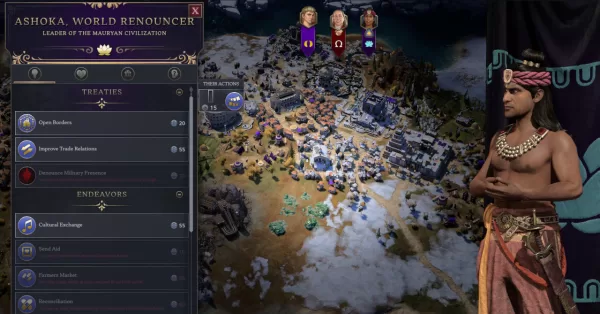Civilization VII: The new Influence system might just be the game’s best addition
Influence being a currency is a big change, but for the better.

The deal table is gone in Civilization VII, and it’s replaced by a new Influence system that I think might just be the game’s best addition, at least based on my quick time with it last week.
Ahead of the game’s launch this February, I got to try out Civ VII at a media preview event, and there, I got to play the game for around three hours. This wasn’t enough to get through a complete game, though I did at least experience an Age Transition, giving me a taste of the game’s new three-age structure.
Each game being split into three ages is no doubt the biggest change in Civilization VII, but while playing it, what stood out for me was the new Influence system. This time, instead of having a deal table where you trade with other Leaders, you earn Influence points which are earned per turn. You can think of Influence as another currency like Gold.
As this is quite a big change, the Influence system and how it was developed was one of the things I asked Executive Producer Dennis Shirk and Lead Game Designer Edward Zhang in my interview with them.
To start, Shirk explained that the Influence system was brought about because the devs wanted to remove the deal table:
“It started out very different from where it ended up. One of the overarching goals that the team universally said was they want to kill the deal table. The deal UI, the subject of so many memes, and the AI with the deal table have always been an extreme challenge because there are so many different values among everything you can trade. We wanted to give a lot more options for how you interact with other leaders.
It started from a token-based system with tokens that refreshed. There are a lot of different things that we tried, but when we finally came around and landed on the current Influence system, that was when everything started to click.”

It’s interesting that when the current version of the system was implemented, everything started to click with the devs. This is exactly what it was like to me as Influence being a form of currency made Diplomacy less of an afterthought (which was the case for me with the deal table in Civ VI).
Spending Influence in deals with other Civs and Independent Powers helped the entire Diplomacy system feel less random and exploitable, all while making deals feel more engaging.
What’s interesting is that, despite how much the system makes sense in Civ VII, it was added fairly late into development. Zhang explains:
“Influence didn’t exist in the game until later in the project. It’s a new addition, and it really clicked with everybody.
Back then, it was a deal table. A lot of designers really hated the deal table, so we took that away. We wanted to replace it with something that’s sure, something you earn, like some sort of hardened cash, if that makes sense.
Influence is exactly that. It’s measurable. It’s something you can earn point by point. You see where they come from, and you can spend them just like Gold, in a sense, to purchase a Diplomatic favor. So, I would say that’s a very successful rework. We didn’t have it until very late into the project, but when it came online, everybody was very happy. All the user tests were very positive.”

The user tests being positive echoed my sentiments about this new system, so it’s likely that most Civ players will be happy with this change as well. Hopefully, this is also the case with the game’s other additions like the three-age structure.
Civilization VII will be released on PS5, PS4, Xbox Series X|S, Xbox One, Nintendo Switch, PC, and macOS on February 11, 2025.

